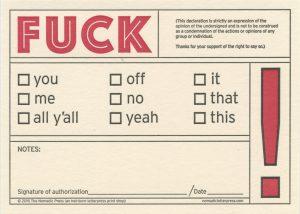Fuck, Yeah!
I recently received several lovely emails from readers of Marcel’s Letters. Their thoughtful messages noted how they couldn’t put the book down or how they, too, “fell deeply in love with Marcel, his family, and the font.” Emails like that make my heart swell until it feels like it could burst.
After I shared these messages with my husband, Aaron, we joked it was only a matter of time before I would receive a letter or email that contained an opposite sentiment.
The timing of our conversation was fortuitous; less than 24 hours later an email arrived from a reader who shared her opinion on my use of the f-word. “It seemed so degrading on the pages, very unprofessional, unfitting, and unnecessary to any part of the story. It causes us to hesitate recommending it to others without ‘apologizing’ for the language.”
The woman went to significant effort to send me the email. First she had to find my email address, then, when her initial email bounced back [she had the wrong address], she sent the email to my publicist, who forwarded it to me. The woman definitely wanted to share her opinion.
While I edited the manuscript, I had several conversations with my book development editor, Jill Swenson, about the inclusion of the word. Jill warned that some readers would bristle at the inclusion of any profanity. I took Jill’s feedback into consideration as I continued editing, but I chose to leave a smattering of f-words in the manuscript. (Note: There are 24 uses of “fuck/fucking,” one “motherfuckers,” and one “asshole”… in total those words account for 0.00024% of the total word count). But because Jill and I had had those conversations, I wasn’t entirely surprised to receive the woman’s email.
Every reader is entitled to their opinion. It’s a reader’s right to dislike the f-word word, or any word (personally, I dislike the word moist), or an author’s style, or the story, or the design of the cover, or the font size that was used, or the paper the book was printed on, or anything else.
Here are a few reasons I chose to leave the f-word in the manuscript, along with a couple of additional observations:
1. Many instances of the f-word are internal monologue (see page 230 when I berate myself: “You. Are. So. Fucking. Gullible.”). Including the f-word in the manuscript was being authentic to internal thoughts in the same way I shared private thoughts with readers about the font or about the frustrations of the search. For better or worse, I was forthright about the words that ran through my head.
2. Some instances of the f-word are in private conversation between Aaron and me (see page 263: “You have got to be fucking kidding me.”) Again, for better or worse, I feel comfortable using the f-word in conversation with Aaron where I would not with my mom or with my design clients. Aaron is not offended by the f-word, whereas I’m certain my mom is, and using that word with clients would be unprofessional. It’s not that I’m being authentic or inauthentic with one or the other, it’s that I can turn on or off a filter based on who I am with. I chose to believe readers who opted to read a book on World War II forced labor (compared to, say, readers of a crochet how-to book) would not need a filter, and I chose to talk to readers like they were a friend, not a client.
3. There are only a couple of places in the book the f-word is directed at a person (or a group of people), instead of at my general frustration with a situation. See page 22: “They were ruthless motherfuckers.” Or page 246: “Fuck! You! Nazis!” If a reader is offended Russian soldiers were called “motherfuckers” for raping concentration camp survivors as they swept through Germany or that I expressed rage at a ruling party who killed millions of people, I have nothing for you. Also, please read #6 below.
4. I don’t have a weak vocabulary, as one Amazon reviewer noted (their comment reminded me of the joke, ‘If you say cursing is due to a limited vocabulary, you’re an audacious, idealogically unsound presumptuous motherfucker’). Besides, that assertation has been scientifically debunked. Some words simply don’t have the auditory snap of the f-word. Imagine this internal monologue from pages 195–196 while I was panicking about the impending TypeCrit — but using non-profane language: “What the crumb have I signed up for? … Dang-nabbit. How can I get out of this?”
5. At one of the book clubs I had the honor of joining, a reader told me the use of the f-word provided proof of an honest relatability. “I knew I could trust you,” she said after seeing the f-word on the page. So, it seems the word is like the color orange: people love it or hate it. Rarely is someone ambivalent about the color orange. Note: Researchers from the University of Cambridge, Maastricht University, Hong Kong university and Stanford found that those who swear more are more likely to be honest people.
6. Finally, if someone reads the entire book and find themselves outraged by my use of the f-word — but doesn’t have anything to say about the human rights violations of forced labor or the countless atrocities of World War II — I just might suggest they aren’t focusing their ire on the right thing. And I am entitled to have that opinion.
After writing this blog post I recalled I purchased these notecards
from my favorite letterpress printer, Kent Aldrich of The Nomadic Press:


carolyn
March 29, 2018 at 10:05 pmBahaha! Love it!
Michelle Jorgensen
March 29, 2018 at 9:20 pmI am so glad you clarified that in a crochet how-to book the “F” word is just not appropriate. But… as you must know, in a knitting book the “B” word is quite acceptable, and in fact encouraged.
https://www.amazon.com/dp/0761128182/ref=rdr_ext_tmb#reader_0761128182
xxoo